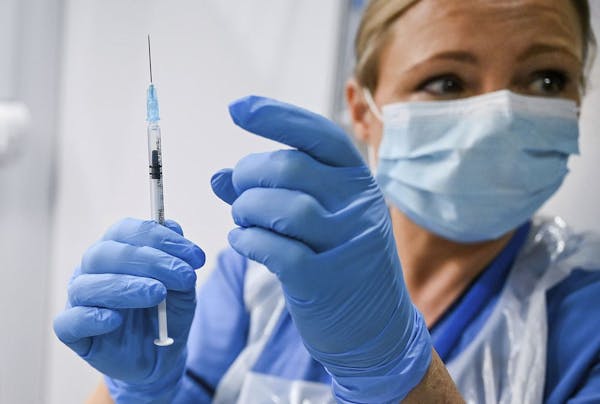The number of COVID-19 patients in Minnesota intensive care beds declined to 50 on Wednesday, a signal to at least one doctor that the state's vaccination campaign is paying off.
Total COVID-19 hospitalizations declined this week to a level not seen in Minnesota since mid-September, but the number of those patients in ICU beds declined to a level not seen since April. At its peak on Dec. 1, Minnesota had 399 COVID-19 patients admitted to ICU beds.
Dr. Andrew Olson of M Health Fairview said the more rapid decline in ICU admissions suggests that the oldest and most vulnerable patients are getting vaccinated, so fewer people needing hospital care are suffering severe cases of COVID-19.
"We're probably seeing a benefit of that," said Olson, M Health Fairview's director of COVID hospital medicine.
The state also reported seven COVID-19 deaths on Thursday and 996 diagnosed infections with the novel coronavirus that causes the respiratory disease. While those raised the state total to 6,450 deaths and 481,831 known infections, they reflect a continued slowdown in viral activity and increased vaccination.
"We will see cases continue but we will see mortality fall if you vaccinate the most vulnerable," Olson said.
The state on Thursday reported that 783,214 people in Minnesota have at least received first doses of the two-dose Pfizer and Moderna COVID-19 vaccines, and that 386,256 of those people have completed the series. The state projects that more than 42% of senior citizens in Minnesota have at least received a first dose.
Seniors are prioritized for vaccination in Minnesota along with health care workers, long-term care residents and educators. People 65 and older have suffered 89% of Minnesota's COVID-19 deaths, including five of the deaths reported on Thursday. Four of the deaths reported Thursday involved residents of long-term care, despite vaccine being offered in all nursing homes in the state and a rising number of assisted-living facilities.
Gov. Tim Walz and state health officials were set on Thursday to announce plans for the next priority group of vaccine recipients. Younger adults with chronic health problems and workers in essential front-line industries are next in line, and will receive access once the state estimates it has vaccinated at least 70% of senior citizens.
Pressure to keep the focus on seniors emerged in a Senate hearing Wednesday. Sen. Karin Housley, the Republican chairwoman of the Senate Family Care and Aging Committee, argued that the Walz administration should hold off on rolling out vaccines to other groups until all of Minnesota's 920,000 seniors have had the opportunity to be vaccinated.
"To further dilute the vaccine … that's a message that's hard to tell seniors when they are scrambling everywhere trying to find it," Housley said. "To say these communities are particularly hard hit, can it be any harder hit than our seniors?"
Health Commissioner Jan Malcolm defended the state's tiered approach, saying the state would consider focusing on seniors but must begin rolling out the vaccine to other high-risk groups and minority populations as supplies of the vaccines expand.
"If you look at any age group, and within that age group, including our elders, the rates of hospitalization and death for certain populations is multiples of the white population in that same age group," Malcolm said. "The point is, if we're talking about vaccinating our elders, it is important to do some extra effort to vaccinate in the African American, Asian-Pacific Islander and Latinx communities to reach elders in those communities because indeed they are being hospitalized and dying at significantly higher rates than the overall 65-plus population."
Improving metrics of COVID-19 activity in Minnesota include a 3.7% positivity rate of diagnostic testing, which is below the 5% caution threshold for uncontrolled viral spread.
However, state health officials remain concerned about the emergence of new, more infectious variants of the virus as well as some localized flare-ups throughout Minnesota.
Local public health leaders in Pennington and Red Lake counties in northwestern Minnesota are confronting an increase in COVID-19 cases that appears tied to multiple infections in workplaces, schools and sporting activities, said Kris Ehresmann, state infectious disease director.
"We cannot let our guard down," said Ehresmann, urging continued mask-wearing and social-distancing efforts to prevent the transmission of the SARS-CoV-2 virus.
Staff writers Chris Serres and Glenn Howatt contributed to this report.
Glenn Howatt • 612-673-7192

Want to share info with the Star Tribune? How to do it securely

'Safe recovery sites' would offer syringes, naloxone and more to people using drugs. The plan could be in peril.
New Minnesota GOP leaders seek peace with party's anti-establishment wing

Who is Republican Lisa Demuth, Minnesota's first House speaker of color?

